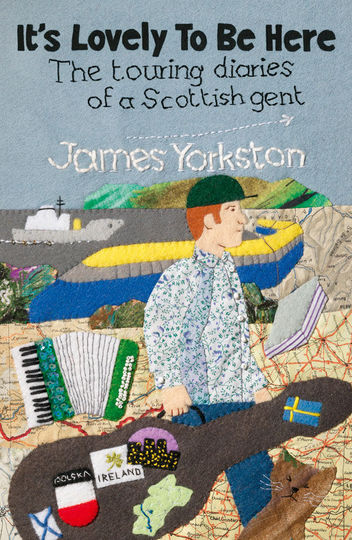It’s Lovely To Be Here: The Touring Diaries Of A Scottish Gent by James Yorkston (The Domino Press. Paperback)
Review by Jude Rogers.
You’ll like James Yorkston.
James Yorkston, if you’re not aware of his marvellous work, is a Scot, a redhead, a father, a gent, and a folk music-loving singer-songwriter, whose back catalogue could soften the stoniest of souls. He is loosely involved with the Fence Collective, the cluster of musicians from Fife that include such other doughty creatures as King Creosote, Lone Pigeon and Pictish Trail. He is not a folk musician, and if you say he is, he will come and find you. He is someone whose subtle songs, full of the weight of real life and experience, will fold around your bones, become part of who you are. (I would wooze on about the effect of his music on me much more, but this is a book review, and I’ve already woozed enough here: http://50songs10years.blogspot.com/2009/12/48-surf-song-james-yorkston-2008.html). He is also the perfect companion for a pint or four in a Pittenweem pub, or a bag of vinegary chips on the Anstruther seafront – I know, I have been there – and as the characterful voice of his first, wonderful book.
It’s Lovely To Be Here: The Touring Diaries Of A Scottish Gent is no gushing, woah-man chronicle of rock and roll excess. It is a gorgeously slow, rolling trawl through one man’s musical life, full of desert-dry humour, a cast of curious characters, and tiny, rich details. We cut backwards and forwards through time, through tours at home and abroad, throughout the last decade, from his entrance into the biz – a tape sent to John Peel, which was played, but didn’t result in the instant fame he had planned for; a tour he blagged with John Martyn, full of disastrous gigs; a laborious record contract tussle with a small label; to the deal he nearly blew with the same label that still have him as theirs – to the unglamorous realities of life on the road.
And it’s here, just as it is in Yorkston’s songs, that the magic buds and flowers. It appears in garages just outside Galway which sell “sandwiches that I would never consider eating, even in the event of a fire”. It comes in countless, dimly-lit, drip-tray-pungent pubs, where conversations are struck up with white-bearded pipe players who look like “the ghost of Willy Loman coming back to haunt me”, old friends-of-friends whose faces he has forgotten, and a rude, short American who calls him a motherfucker for taking his seat, before he hears Yorkston’s Scottish accent and brings over his girlfriend, prompting our boy to tell the tall tale of a Norwegian bear smashing up his guitar, and dream up the immortal line, “away tae fuck you wee gnome”.
Above all, Yorkston is a master of nailing down the hidden beauties of life, even in its littlest moments. You’ll smile when Yorkston tries to find vegan food in dodgy riders, and the deepest recesses of Ireland, tiny missions utterly alien to the idea of the wandering minstrel. Your heart and belly will long for comfort when he talks, gently and squarely, of missing home, and the haar, and his wife, and his daughter. You also feel for him in his peaceful pursuit of moments alone, be they in the back rooms of gig venues with Dostoevsky’s Short Stories (which he fashions a paper bag cover so he doesn’t look pretentious, before removing it because it looks like he’s reading some porn), or in hotel rooms on bright early mornings, drinking water from taps after sturdy sessions on the booze.
As I come to the end of the book, I felt rather forlorn – as if the landlord was about to shout Time, it long being time for me to drain my glass, walk out into the night, raise my hand to my imaginary flat-cap like my late grandpa, and tip a goodbye. I felt that way because so few singer-songwriters write so fully about their touring lives – from the moment they wake up, to the food that they eat, to the set-up and the soundcheck, to the gigs of varying quality – and fully avoid falling into the traps of hazy mythology or lumpen mundanity, while keeping you with them, keeping you close. It is testament to Yorkston’s honesty as a human being, and his wit as a writer, that he sustains that warmth, and that feeling.
